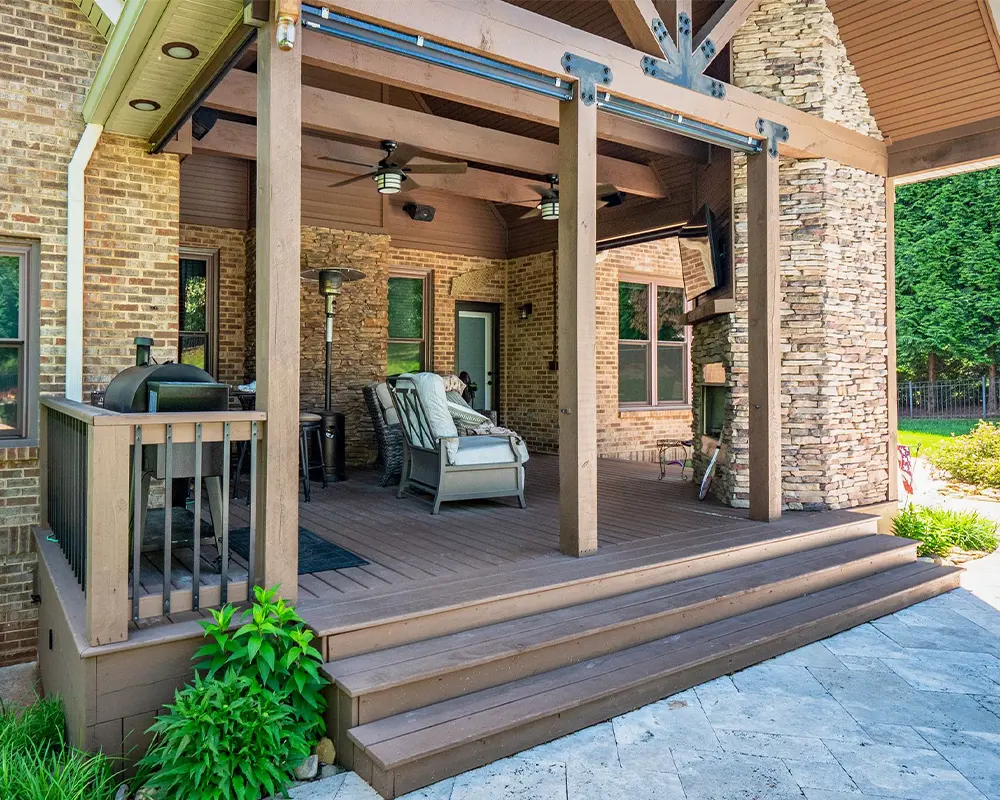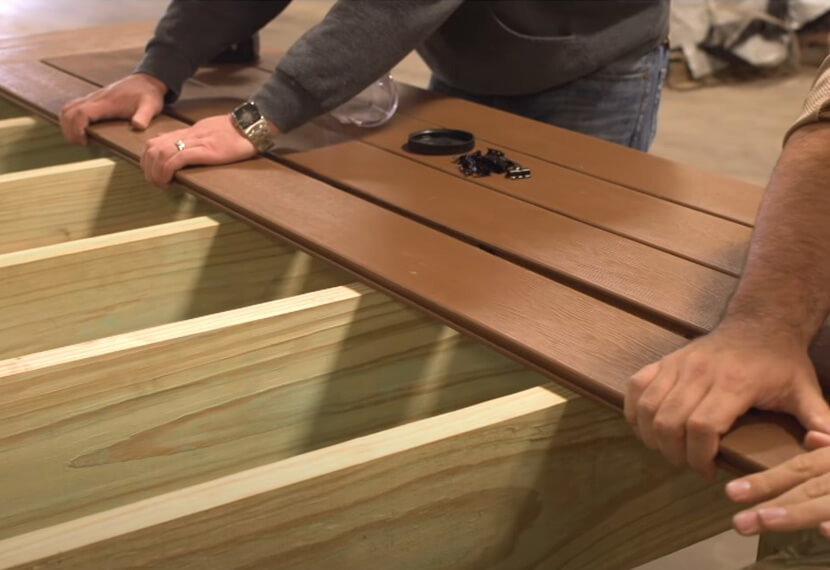Learn everything you need to know about deck installation Austin before starting your next project.
Learn everything you need to know about deck installation Austin before starting your next project.
Blog Article
How to Choose the Right Materials for Your Deck Setup Project
Selecting the ideal materials for your deck installation job can seem overwhelming. There are many elements to take into consideration, from toughness and upkeep to aesthetic appeals and environmental influence. The selection in between traditional timber and composite materials, each with its very own set of benefits and drawbacks, can be specifically challenging. The trick is to balance your budget plan, layout choices, and way of life needs to create a deck that will certainly enhance your outside area for many years ahead.
Recognizing the Various Sorts Of Deck Products
When embarking on a deck installation task, the option of materials becomes a critical decision. Composite products, on the various other hand, are a mix of timber and plastic, offering durability and resistance to weather components. By recognizing these distinctions, property owners can make an extra educated decision on the most ideal deck material for their certain needs.
Reviewing the Durability and Maintenance Requirements of Deck Products
Analyzing the longevity and maintenance requirements of deck materials is a critical step in deck installment. Resilience entails the product's capability to endure rough weather conditions, wear and tear, and its longevity.
Comprehending maintenance demands is equally essential. Some materials call for regular sealing or tarnishing to keep their appearance and stand up to moisture damage, while others, like composite outdoor decking, demand less upkeep. By examining these variables, one can select the most appropriate decking product, making sure a balance between toughness, maintenance needs, and aesthetic charm.
Price Analysis: Contrasting Timber and Compound Decking
Although cost may originally appear like a secondary problem, it is a substantial aspect when comparing wood and composite decking. On the other hand, composite outdoor decking, while more expensive initially, calls for much less upkeep, potentially reducing long-term costs. Possible deck proprietors need to consider their spending plan and readiness to keep their decks when choosing in between wood and composite outdoor decking.
Aesthetic Appeals and Design Versatility of Decking Products
While price is a crucial consideration, the aesthetic allure and layout flexibility of outdoor decking products additionally play a considerable duty in the decision-making process. Various materials supply varying degrees of visual allure. All-natural timber outdoor decking supplies a classic, classic appearance, while composite materials provide a wide array of colors and textures to suit varied preferences and styles. Style versatility refers to the capacity to shape and adjust the outdoor decking material to meet details design needs. Timber, for example, supplies high layout flexibility because of its ease of reducing and forming. Compound products, while much less versatile in layout, are still versatile sufficient for the majority of deck layouts. These elements, as a result, are critical factors in the selection of outdoor decking material.
Environmental Influence of Decking Materials
When choosing decking products, one should think about not just looks and sturdiness, yet additionally the environmental effect. It is very important to examine the sustainability of materials and discover recycled outdoor decking alternatives. Moreover, understanding the possible influence on regional communities will certainly make sure an extra eco accountable choice.
Examining Product Sustainability
In the world of deck building and construction, assessing product sustainability is a crucial action. Composite decking materials frequently combine wood and plastic, reducing the need for brand-new wood but increasing reliance on fossil gas - deck installation. Thus, the option of decking materials must balance functionality, looks, price, and sustainability to make certain an accountable and long-lasting installation.
Recycled Decking Alternatives

Composite decking is especially popular because of its sturdiness and ease of upkeep. It's immune to rot, insects, and fading, making it a resilient alternative. Recycled plastic decking, on the various other hand, is highly resistant and requires marginal maintenance. While these products may lug a higher preliminary cost, their longevity and decreased environmental impact make them a wise investment for the eco-conscious property owner.

Influence On Local Ecological Communities
While the advantages of utilizing recycled products for decking can not be overemphasized, it's equally essential to consider the broader ecological ramifications of these selections. Correct disposal of old decking is essential to minimizing garbage dump waste. Essentially, an eco-conscious deck job needs careful material option, lasting sourcing, and liable disposal.
Making Your Final Decision: Tips for Picking the Best Deck Products
As the short article changes right into the subtopic of "Making Your Decision: Tips for Choosing the most effective Deck Products", it is crucial to understand the selection of deck products readily available. Striking an equilibrium between longevity and aesthetic appeal is necessary in this selection process. The following conversation will guide readers in making an educated choice based on these navigate to this site key considerations.
Comprehending Different Deck Materials
The task of selecting the right products for your deck installment can appear daunting due to the substantial selection of choices available. Comprehending the various products can streamline this procedure. Wood is a popular choice, using a timeless visual and cost. Kinds of wood made use of consist of pressure-treated lumber, cedar, and redwood. Composite products, made from a blend of wood and plastic, are low-maintenance and resistant to rot and bugs. Vinyl or PVC decks are a lot more resilient and call for less maintenance than composite materials, yet they can look less all-natural. Light weight aluminum decks are strong, lightweight, and resistant to rot, however they are also the most costly alternative. Each material has its very own advantages and disadvantages, making it critical to consider your specific demands prior to making a final choice.
Toughness vs. Appearances Balance
Balancing Visit This Link sturdiness with aesthetics can be a challenge when choosing deck materials. The decision usually boils down to individual choices and the deck's intended usage. High-traffic areas might require resilient products like composite decking, which holds up against wear and tear but might do not have the natural appeal of timber. On the other hand, wood supplies a timeless allure and heat that synthetic materials struggle to replicate. Nonetheless, it calls for extra maintenance and may not last as long. For that reason, homeowners need to strike an equilibrium, thinking about both the deck's sensible demands and their visual preferences. By doing so, they can ensure their deck continues to be a useful and attractive exterior area for several years ahead.
Conclusion
Finally, selecting the appropriate materials for your deck setup task requires cautious consideration of factors such as longevity, upkeep, price, appearances, and ecological impact. Whether you go with conventional wood or composite products, your option ought to line up with your budget, layout preferences, and way of life. Ultimately, the very best outdoor decking material is one that improves your exterior room and offers enjoyment for years to find out here come.
Report this page